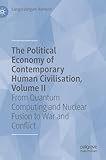The political economy of contemporary human civilisation, volume II: from quantum computing and nuclear fusion to war and conflict
Material type: TextPublication details: Cham Springer 2025Description: xix, 330 pISBN:
TextPublication details: Cham Springer 2025Description: xix, 330 pISBN: - 9783031841842
- 338.9 RAM
| Item type | Current library | Collection | Call number | Vol info | Copy number | Status | Date due | Barcode | |
|---|---|---|---|---|---|---|---|---|---|
 Book
Book
|
Indian Institute of Management LRC General Stacks | Public Policy & General Management | 338.9 RAM (Browse shelf(Opens below)) | Vol. 2 | 1 | Available | 009068 |
Browsing Indian Institute of Management LRC shelves, Shelving location: General Stacks, Collection: Public Policy & General Management Close shelf browser (Hides shelf browser)
Table of contents:
Front Matter
Pages i-xix
Download chapter PDF
Introduction
Sangaralingam Ramesh
Pages 1-16
Quantum Computing and Nuclear Fusion
Sangaralingam Ramesh
Pages 17-52
Biotechnology
Sangaralingam Ramesh
Pages 53-91
Cryptocurrencies
Sangaralingam Ramesh
Pages 93-140
Space Exploration and Space Travel
Sangaralingam Ramesh
Pages 141-181
Renewable Energy Technologies
Sangaralingam Ramesh
Pages 183-218
War and Conflict: The Last 5000 Years of Human History
Sangaralingam Ramesh
Pages 219-268
Conclusion: Humanity at a Crossroad
Sangaralingam Ramesh
Pages 269-312
[https://link.springer.com/book/10.1007/978-3-031-84185-9]
This book, the second of two volumes, examines the evolution of humanity and development global economic systems to provide insight into the advances and challenges they have created. By placing modern technology and global crises within the context of long-term human development, it evaluates the threat of climate change on future generations by showing how past civilizations have survived and succumbed to climate events. The potential for artificial intelligence, quantum computing, nuclear fusion, and biotechnology to combat the current global challenges is explored, alongside possibilities of new technologies exacerbating poverty, inequality, and social division.
This book highlights the consequences of human cognition and the constant desire for economic growth and evaluates whether they have been a net positive for human society. It will be of interest to students and researchers working on political economy and global challenges.
(https://link.springer.com/book/10.1007/978-3-031-84185-9)
There are no comments on this title.







